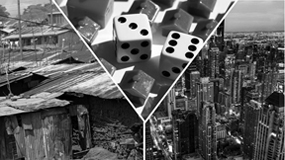
KWIC Hunger Games Rescheduled!
Friday March 22, 2:00 p.m. to 4:00 p.m.
West Bank, Lady Eaton College, The Pit

Capitalism. We all know the term, we all know it exists, but how often do we look at the world around us and recognize it? Probably not very often. Not that one should. Paradigms develop from the world to which one is exposed, based on the things we see, the people we know, and the food that we eat.
When Wade Davis was here, he mentioned that in some countries prayers and artistic expressions of the human soul are inscribed upon the walls of their communities, reminding people everyday what it means to be human and alive on this earth. Walk downtown in any urban environment in the “Global North” and you see thin people in their underwear reminding you of what it means to be human and alive on this earth.
As Davis has also mentioned, “Genocide, the physical destruction of a people is universally condemned, but Ethnocide, the destruction of a people’s way of life is not only not condemned, it is usually, in many quarters, celebrated as a part of a development strategy.” I imagine the people living in the communities marginalized under the doctrine of capitalism cling on to the sacredness of the words on the walls with whatever energy and hope they can muster while their traditional ways of living are very dramatically set on the verge of extinction.
I wonder if that energy is just as strong as the desire to be “sexy” is here in North America. Because if we have the job, have the car, have the “bod” that fits ever so snuggly to the clothes that are advertised to harness our status and make us feel valued, then maybe we’ll find someone to be intimate with, and then maybe that void, that lack of sense of purpose and belonging that we so eagerly crave for, will be filled.
It’s pretty nuts to think that the 11 year old girl I used to babysit was toying with the idea of anorexia because she weighed five pounds more than her best friend. Her paradigm didn’t manifest from nowhere-already, at the preteen stage, the media infiltrated her thoughts to make her feel unvalued.
The Hunger Games was a great movie. Not only was Katniss Everdeen an awesome and sassy force not to be reckoned with while she did what she could to defy systemic oppression imposed by dogmatic power structures, but the premise of the movie was an important political message exploring the concept of “Fortress Capitalism”.
The term is one that I first heard when Bob Lovelace spoke at Bagnani Hall back in the fall about the architecture of a decolonized society. Google-searching aided me in finding the following definition: “a system with declining fortunes for all but a minority who seek protection behind walled and gated communities.”
Last week, I went with my roommate to go see our friend, Mike Reaume, speak at Fleming College in Lindsay. Mike was in Afghanistan with the Canadian Armed Forces. Twice.
Holding the lifeless body of a small child and watching pain gathering from all cavities possible within the human existence to surface as the expression on the face of that child’s uncle is something hard to shake off. It makes it even harder to shake it off when the brain clicks in to realizing that the death of that child is the very hidden yet very real cost of a healthy import economy for North Americans.
The war in Afghanistan is something I know little about. It’s also something I don’t think we’re supposed to know much about. The media filters the information we digest all the time.
Reaume was there, though. Reaume didn’t click in to the real notion of why he was really in Afghanistan until the second time round when a very profound wake-up call slapped him right across the face and he was able to step outside the robot he was conditioned to become and see things as they really were.
As Reaume now understands, there was no civil conflict or unrest in Afghanistan. There was only a very realistic example of just how entrenched in a capitalist world we really are. And how far the human condition called ‘greed’ can go if one chooses to let it.
It’s easy for us to go on living our lives while ignoring the hidden costs of world suffering. As in the mega city in The Hunger Games, resources are easily provided for our consumption, enabling us not to expend energy growing our own food or walking long distances for drinking water.
Our homes are heated, our fridges full, our toilets flushable- we have our basic needs looked after. Therefore, we can focus that energy on other things within a “progressive” society. The people on the streets of the mega city in The Hunger Games dressed in accordance with the extravagance of Lady Gaga. Is that so different than the models we see on billboards promoting a very misleading and consumption-based notion of what it means to be beautiful?
KWIC Hunger Games is a model developed to explore the ways in which capitalism can create a platform for such rash inequalities in the world. Participants will be divided into country groups and provided with a package of resources and tools. From there, it’s up to the participants to devise their own strategies to compete for wealth and refuse to fall into the margins of fortress capitalism.
Discussion afterwards will focus on irrationalities within the current neoliberal agenda that continues to colonize the world. Together, we can work to further understand the capitalist world paradigm by playing a game based on a simplified model of world systems styled similarly to Settlers of Catan/ Risk/ Monopoly.
